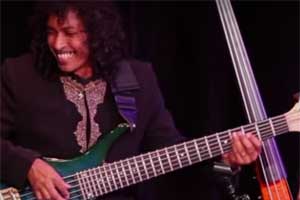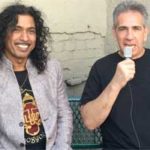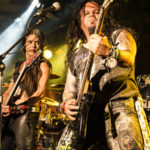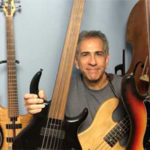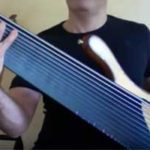Bassist/composer/producer/engineer describes his musical path, from his native Sri Lanka to becoming one of the most sought-after bassists in LA
Exclusive interview with FBPO’s Jon Liebman
March 9, 2016
A native of Colombo, Sri Lanka, Hussain Jiffry grew up in a musical family, where he played accordion, keyboards and guitar before that magical night when he discovered the bass. After becoming established in the Sri Lankan music scene, Hussain left home to tour Europe with an R&B band, a gig that lasted several years. In 1988, Jiffry moved to California to study at the Musicians Institute in Hollywood.
After graduating from MI, Hussain took any gig he could find until he was eventually hired by Brazilian bandleader Sérgio Mendes, “officially” kicking off the young bassist’s career. He remained with Mendes for 18 years.
Throughout the course of his career, Hussain Jiffry has performed and/or recorded with a long list of notable musicians, including Tom Scott, Michael Bolton, Joe Williams, Petula Clark, Freda Payne, Kenny Kirkland, David Foster, Michael McDonald, Bobby Brown, Dionne Warwick, Chaka Khan, Pam Tillis, Jonathan Butler, the Four Tops, Dave Weckl, Steve Winwood, Whitney Houston, Tito Puente, Christopher Cross and countless others. He currently tours and records as a member of Herb Alpert and Lani Hall’s quintet.
FBPO: You’re from Sri Lanka.
HJ: Yes. Colombo, Sri Lanka.
FBPO: I’m very curious to hear about your early days, growing up in Sri Lanka, and your first exposure to music. How would you describe your musical upbringing?
HJ: I was always drawn to music for as far as I can remember, from the time I could barely walk. My sisters and my brothers played a little bit of piano in the house. We had a piano and we had a record player and a radio. Any time there was music played, I was always drawn to it. My mom played a little bit of piano. She was classically trained, so she could play if there was music in front of her. I don’t think she played by ear, but one of my brothers did. For me, music was like a magnetic pull. Sometimes, we’d go to a wedding and when there was a band playing, I would forget to have dinner and just stare at the band! I always wanted to play.
FBPO: What kinds of music do you remember hearing during those early years?
HJ: On the radio, they played a wide variety of stuff, from music from Sri Lanka, folkloric music, to a little bit of jazz, a little bit of music from Europe, polkas… We had an interesting mishmash of stuff that was played on the airwaves. Sri Lanka’s an interesting place because of all these races. We were a Portuguese colony, a Dutch colony, a British colony, so there were all these influences. There are Malaysians and Chinese that lived there too. I was exposed to a lot of different styles of music on the radio.
FBPO: What about American music? Did you get to hear the Motown stuff and the disco stuff? And what about the Beatles?
HJ: The Beatles, for sure. We listened to a lot of stuff that came from England. Motown, not so much, but, very interestingly, there were songs that were played at casuals and weddings and parties and some of those songs I’d never heard. Songs like “I Heard It Through The Grapevine” never made it to Sri Lanka! [Laughs] But the Bee Gees were very popular in Sri Lanka and the Beatles, some Rolling Stones. Mostly European and British music.
FBPO: How did you become a bass player?
HJ: Well, I played the piano at home till I was about 6. I lost my dad when I was 3 and my mom brought me up all by herself. When I was about 6, she moved out of the main house where my other siblings lived. There was some sort of discrepancy and she took me and one of my brothers and moved out. When that happened, we didn’t have a piano any more. I was really bummed out because I would go and plunk on the piano when I was 3 and 4 years old and listen to my siblings play. So I was longing for an instrument.
My mom couldn’t afford a piano and when I was about 12, I talked her into buying me an accordion. That was my first real instrument. She got me a teacher, who also played by ear, and would come over to the house on his motor scooter once a week and he taught me whatever tunes I wanted to learn. He had a notebook and he would write the notes – A, B, C – in a very unorthodox form. There was no written notation. I don’t think he knew how to write (music), but he was a very enthusiastic guy and he taught me a few tunes on the accordion. After that, I started playing accordion in the school band.
FBPO: What kind of music were you playing?
HJ: Just pop tunes of the day.
FBPO: Pop tunes from Europe, Britain, Sri Lanka…?
HJ: Yeah, maybe a Beatles tune or two. And we had this music called baila, which is in 6/8. There’s speculation that this music was brought down to Sri Lanka by some African slaves who actually live in a small part of Sri Lanka, on the northern west coast. There is music that is similar to baila that they play in Sri Lanka, from Mexico and Venzuela. They have this rhythm where the bass drum is on one and five, which is a really infectious, fun, dance groove, very popular to this day.
Baila is one of the most popular dance forms in Sri Lanka. If you played in a dance band and you played a baila, everybody came to the dance floor. The lyrics are very funny, too. Most of the time it’s a story of some sort. Very simple music, I-IV-V most of the time. It’s very upbeat and has a beautiful swing to it. I used to play baila on the accordion.
Then when I was about 15 or 16, I talked my mom into buying me an acoustic guitar, a locally made instrument, and took some lessons from a little music school that was giving lessons in keyboards and guitar. It was the same thing there, where they just taught you tunes. There was no theory or technique or anything taught because nobody really knew anything about that. It was kind of passed down from generation to generation, I think.
FBPO: How did you eventually gravitate to the bass?
One day, when I was about 14, 15, I was at a wedding and there was a local band playing and they were playing a 12-bar blues. The bass player had such a beautiful sound. He was playing through a Fender “Bassman,” if you remember those.
FBPO: Yep!
HJ: The Fender Bassmans, I think they had two 15s in them, all tube.
FBPO: I remember!
HJ: And this guy was playing rock & roll and that particular night I was mesmerized by the sound of the bass, very fascinated with how he was playing it and how his part related to the tunes. I tried to memorize that bass line until I got home. I kept singing it in my head and when I got home, the first thing I did was run to my acoustic guitar and try to figure this thing out, what he was doing. And I did!
That was a revelation to me. I was like, “Wow! What a cool instrument! What a cool part!” I was so excited to figure out what this bass part did to the tune, how it made it swing the way it did. That was the first time I became aware of the bass and its role in music.
FBPO: Did you start listening to music differently once you discovered the bass?
HJ: Yeah!
FBPO: Were there any bass players in particular that you took note of? Who were your bass influences?
HJ: Well, Paul McCartney, for one. And we played some Elton John tunes and I liked the way Dee Murray played on “Crocodile Rock” and all those tunes. I loved the way he played and I would try to figure out his bass lines, note-for-note. There were other bass players whose names I didn’t know, like the guy who played on the records with the Bee Gees. I think they were studio musicians from Australia. Those were my early influences on the bass.
FBPO: You spent quite a bit of time playing in Europe.
HJ: Yes. I had been playing in various Top 40 bands in Sri Lanka, getting my feet wet, from the time I was 15 till about 19. I landed a little gig in Colombo with a very popular singer and newscaster and I had played with her for about six months. That band played some really challenging tunes – Chaka Khan tunes and some disco tunes with interesting bass lines. We played a lot of Commodores too.
While that was happening, I knew there was more out there and I was starting to get a little frustrated with the scene in Sri Lanka. Nobody was really going anyplace. We were playing cover tunes.
I loved listening to jazz. Friends of mine would bring me tapes and things and I wanted to start playing jazz and becoming a better musician, but there was nobody to play with or study with or to listen to me. We were all kind of on the same level.
So I wrote to the Berklee School of Music, hoping to come to Boston and study. At the time, though, we were making twenty-five hundred rupees a month, playing five nights a week. That was equivalent to about twenty dollars a month, so right then I said this is not going to work out! [Laughs]
So that was kind of a downer and I continued playing in that same band until one day a friend of mine came over to me and said there was an opportunity, if I wanted it. His brother had a band that had a gig in Europe, playing the Top 40 club circuit, and they needed a piano player. I didn’t have to think too hard! I said, you know, I’ll take the gig because here’s an opportunity for me to go and play some music, even if it’s not playing bass, and get some experience playing piano and hopefully make some money to be able to afford school in the states. So I agreed and that’s what took me to Europe.
I did the gig for about three years and I felt like I was getting a little closer to trying to make this dream come true, to go study music in the states. So I said I need to start playing bass. At the time, there was another band from Sri Lanka that needed a bass player and they asked me to come in and play bass. I very reluctantly agreed because the guys that gave me this break were really sweet and they were good friends of mine and we were like brothers and I hated to leave them, but I said if I’m going to continue playing bass, I need to make this change.
I joined the other band and played with them till the end of 1987. By that time I had heard of the Musicians Institute in Hollywood and at the beginning of ’88, I made it to MI. I made a little cassette tape of the bass solo to “Rio Funk,” the Marcus Miller solo. Remember that Lee Ritenour tune?
FBPO: Know it well!
HJ: I had a cassette recorder and I played my bass with this mechanical metronome into a cassette recorder and then sent it to MI as my audition tape. I passed the audition and got accepted and that’s how I made it to LA.
FBPO: How did your career get rolling once you left MI?
HJ: Once I got out of school, it was rough for the first two, three years because I was new in town and there were a lot of great bass players in LA. I met a saxophonist that did a lot of coffee shop gigs for very little money, sometimes no money. But we played three, four nights a week. In LA, there were a lot of really fine musicians who came to these gigs. This guy called us because it was an opportunity to play some jazz and some funk. We were playing Tower of Power tunes, jazz standards, all kinds of stuff. I played in some Top 40 bands too. I’d take any gig that was offered to me. I also worked as a courier driver in LA for about a year because I got married and my son was born and I had to make a living and the coffee shop gig wasn’t enough to make ends meet.
I’d been getting my name out, meeting people, going to jam sessions, playing in community college big bands. Then we formed a Brazilian band called Samba Guru with a singer Katia Moraes from Brazil, which was a really great band. One of the drummers that played at the jam session, who played a lot of Brazilian music, was Tony Shogren and he introduced me to Katia.
In the meantime, I was also playing with Kleber Jorge, a really great singer/songwriter, who’s still playing with Sérgio (Mendes). One day I heard Sérgio Mendes was looking for a bass player and these guys recommended me because they were all part of Sérgio’s band. That was my first touring gig. I was really excited because Sérgio was traveling all over the world at the time. We went to Europe, Japan, Asia. That was my first real big gig and I played it for about eighteen years. I just stopped playing with him about a year ago.
FBPO: You’ve been with Herb Alpert for a while.
HJ: I’ve been a part of Herb Alpert and Lani Hall’s quintet. Michael Shapiro, who plays drums with us, was also Sérgio’s drummer, so Mike recommended me and a piano player, Bill Cantos, a really amazing singer/songwriter. We showed up at Herb’s house and played for a couple of hours. He liked what he heard and he invited us back and we started working out tunes.
The next thing you know, we got a couple of gigs at his club. He has a beautiful club in Bel Air called Vibrato. Then things started happening and he decided he wanted to take the band on the road and we started doing gigs around the states. We’ve been to Canada, we even went to Japan last year. We’re working on our sixth album now, so that’s been a blessing and a really fun musical situation for all of us, pretty loose and creative and fun.
FBPO: Tell me about the music. I understand you only play a handful of Tijuana Brass songs. That’s not really what the gig is about, is it?
HJ: No, not at all. Tijuana Brass, we have a little medley that’s about five or six minutes long and we play a few of the hits like “Tijuana Taxi,” “A Taste of Honey,” “Rise,” just for the fans who come to see him who know him from that era. And it all goes over very well because these are tunes that they heard all their life.
The band mostly plays arrangements of the American songbook, some pop tunes and some original music. We all contribute to the arrangements of the songs and I think it’s a fun listen. It’s a fun show because it kind of moves at a nice pace. Lani Hall, Herb’s wife, who was the lead singer for Brazil ’66, sings, so I would say it’s about seventy percent vocal material and about thirty percent instrumental.
It’s a really interesting sound we have. I play a six-string on the gig and sometimes I comp and play chords, kind of like a guitarist does. They give me the opportunity to play a lot of different styles and I get a lot of interesting sounds from my bass, so I really dig it.
FBPO: Tell me a little more about your equipment. What kind of gear are you using?
HJ: My instruments have been Bossa basses. They’re made in Japan by Toshio Setozaki. It’s a small company, a boutique company. I’ve played his basses for almost twenty years now. That’s predominantly what I play, in the studio and live. I have some other basses, Yamahas and Fenders, that I mostly use in the studio, but for my live axes I just use Bossa basses because they have a really nice mid-point and their basses fit in the mix really well with a lot of definition. Plus the instruments are really light, which is easy on my shoulder and on my back. It’s mostly a six-string that I play, the Bossa OB6.
FBPO: Tell me why you like Trickfish amps.
HJ: I’ve known (Trickfish founder) Richard Ruse for a long time. Two years ago, a friend, Federico Pol, who lives in Seattle, called me up and said, “Hey, if you’re going to the NAMM show, check out this amp that Richard’s building,” so I said, “Sure.” I walk by the amp and I see Richard there, playing his bass through the amp and I really liked the sound. I usually shy away from trying basses or amps at the NAMM show because it’s so noisy, but when I heard the amp, it had a lot of nice, round bottom end that was nice and tight. I said, “Hey, after the NAMM show, if you let me try this rig out, I’d love to have it for a couple of weeks and see what it does.”
The model was the “Bullhead” amp with two cabinets that have one 12” driver and a horn. I tried it for a couple weeks and I really loved it because of the size of the amp and the speakers and it was pretty versatile. I tried it on Herb’s gig at a bunch of performing arts centers and some club gigs. I loved the fact that the cabinets are front-ported, so there were no weird reflections coming off the back and bouncing off the wall. I’m really digging it. That’s what I take on the road because I have the luxury of traveling with my own rig on Herb’s gig, so that’s kind of a treat, you know?
FBPO: What else is keeping you busy, Hussain? You were subbing for Vail Johnson on the Kenny G gig not too long ago, right?
HJ: Yeah, I got a call from the percussionist, Ron Powell, who said Vail couldn’t do a tour. I had about a week’s notice. I was out with Herb and Ron said, “Would you like to go to Asia?” And I said, “Sure!” They sent me some CDs and I learned all the tunes. We didn’t really have a rehearsal or anything. I met Kenny on the tour bus on the way to the gig. We ran through a few heads and did the show!
FBPO: How did it go?
HJ: It was great! I really had a good time. We were in Malaysia, Indonesia and Singapore, playing sold-out concerts. He’s very popular in those parts.
FBPO: What about the future? What else would you like to do that you haven’t accomplished yet?
HJ: What I’d really like to do is finish my solo album. It’s many years in the making and I kind of shelved it for a while because I’ve been busy doing other records and trying to make a living. I’m hoping it will be this year, if I can set aside some time.
FBPO: What would you be if you weren’t a bass player?
HJ: Probably a photographer or an architect. I was really good at machine drawing and mechanical drawing when I was in school. I also had my own darkroom at home and did black and white photography.
